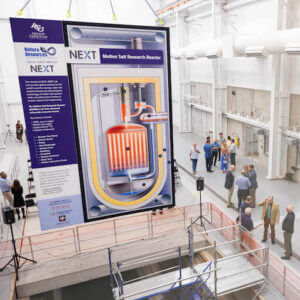
This week the Nuclear Regulatory Commission (NRC) announced it will complete the safety assessment and construction permit issuance for the Natura Resources-funded Molten Salt Research Reactor (MSRR) at Abilene Christian University by Sept. 30.
In March, the NRC completed the environmental assessment of the Natura-funded MSRR at ACU. The reactor will be the first deployment of Natura’s 1 megawatt thermal molten salt reactor system, the Natura MSR-1, and is the first liquid-fueled molten salt reactor design ever reviewed by the NRC.
ACU’s Nuclear Energy eXperimental Testing Lab (NEXT Lab) has been working alongside the Georgia Institute of Technology, Texas A&M University and The University of Texas at Austin as part of the Natura Resources Research Alliance to license and deploy the Natura-funded MSRR at ACU.
In its environmental assessment, conducted in accordance with the National Environmental Policy Act, the NRC issued a finding of “no significant impact.” The environmental assessment is one part of the construction permit process, and its findings indicate that the environmental effects are not detectable or are so minor that they will neither destabilize nor noticeably alter any important attribute of the resource, said Benjamin Beasley, NEXT Lab’s director of licensing.
“The environmental assessment and upcoming completion of the safety evaluation for a construction permit are significant steps forward in the first deployment of the Natura MSR-1 system,” said Douglass Robison, founder and president of Natura Resources. “This deployment at ACU will not only demonstrate successful licensure of a liquid-fueled molten salt reactor but will provide critical operational data that will help us meet the world’s growing energy needs.”
Issuance of a construction permit in September will enable the Natura team to begin fabrication of the historic liquid-fueled molten salt reactor.
“This groundbreaking research has applications not only for clean energy but for clean water and the production of needed medical isotopes. We’re thrilled to see how this technology will bless people around the world,” said Dr. Phil Schubert, ACU president.
NEXT Lab
The mission of ACU’s NEXT Lab, powered by Natura Resources, is to provide global solutions to the world’s need for energy, water and medical isotopes by advancing the technology of Molten Salt Reactors while educating future leaders in nuclear science and engineering. Students work alongside faculty seeking creative solutions to complex problems, gaining real-world experience and seeing firsthand how innovation and collaboration can impact the world. NEXT Lab provides extraordinary opportunities through ACU’s departments of engineering and physics, chemistry and biochemistry, and others. Learn more at acu.edu/nextlab.
Natura Resources
Natura Resources LLC is a leading advanced reactor developer committed to answering the world’s increased demand for reliable energy, medical isotopes and clean water by developing commercially deployable molten salt reactors. Natura’s small modular reactors are liquid fueled and molten salt cooled, which increases efficiency and reduces waste. Natura’s first reactor design, Natura MSR-1, is the basis of the first liquid salt-fueled molten salt reactor design ever reviewed by the U.S. Nuclear Regulatory Commission. Natura is intensely focused on performance. Founder and president, Douglass Robison is a third-generation oilman with a proven track record of revolutionizing the energy industry with innovative technology and results. Learn more at naturaresources.com.
— Wendy Kilmer
June 14, 2024
